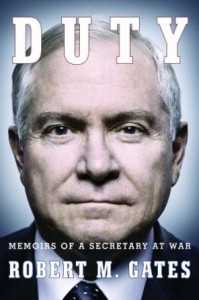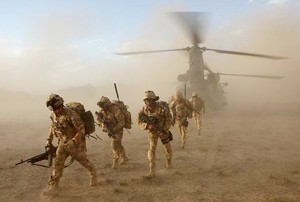As Aeschylus said in the 5th century BC, “In war, truth is the first casualty.” The new book by Robert M. Gates, “Duty,” which my local Barnes and Noble librarian informs me is already a best-seller though it just came out, proclaims its speciousness in the title, and pronounces a fact to cover an egregious falseness in the very first sentence.
 “Duty” is an anachronistic concept that’s in its death throes, though militaristic sentimentalists like Robert Gates the world over are not letting go, even when they trip and break their necks over it. To be blunt, the dubious virtue of duty toward country has become treason against humanity.
“Duty” is an anachronistic concept that’s in its death throes, though militaristic sentimentalists like Robert Gates the world over are not letting go, even when they trip and break their necks over it. To be blunt, the dubious virtue of duty toward country has become treason against humanity.
The first line of the author’s note in “Duty” gives any thinking person pause: “This is a book about my more than four and a half years at war.” After seeing Gates hawking his book on every talk show that would have him over the last week, the overriding feeling in the wake of his wake is an admixture of disturbance and sorrow.
Not just because this man, the Secretary of War under Bush and Obama, is so thoroughly misguided, but because of what this book says about how little we’ve learned and grown as a people since the evil perpetrated on Iraq, the region and the world by the Bush-Cheney Administration.
Gates, who sets himself up as a tough-minded advocate for the soldiers who fought America’s dirty little wars in Afghanistan and Iraq, ends up sounding just plain sappy. “There is a parallel theme [besides God and country] to my four and a half years at war: Love…the love I came to feel for the troops.”
Feeling no pressure to reflect in a culture in which it is almost impossible to find a single voice raised against the cult of heroes and ‘the fallen,’ Gates belies his love, and proves his sentimentality, when he writes: “Toward the end of my time in office, I could barely speak to them or about them [the troops] without being overcome by emotion.”
This schmaltziness would not be worthy of comment if it were not so dangerous. America’s veneration of its soldiers reflects a deep sickness in the nation’s soul, a falseness so slathered with unassailable righteousness that it warps and corrupts beyond all recognition the very values it supposedly holds so dearly and proudly.
How, someone from another land might ask, has the soldier in America, conscripted by economic desperation, come to be venerated above all other stations and service? The basic reason is that people and politicians have projected onto soldiers what is left of the virtues and values of a once-great nation, virtues and values that have become completely sentimentalized in the vast emptiness at the core of this country.
By imagining we can love warriors while divorcing them from the wars they carry out, immensely destructive governmental policies are conveniently separated from their personal consequences, for the politicians and soldiers alike. Such a schizoid contradiction has given the US government a free hand to remotely and secretively carry out its malevolent policies, while allowing the people to expiate the guilt of sending their sons to be killed and maimed in ancient conflicts made much worse by American intervention.
America’s war in Afghanistan began with wrong premises, while the invasion of Iraq began with outright deception. Both conflicts had their false foundation in America’s image of itself following our Pyrrhic victory in the Cold War. The brief, halcyon decade of ‘sole remaining superpower’ and ‘indispensable nation’ crumbled, literally and metaphorically, with the collapse of the Twin Towers.
Both conflicts had their false foundation in America’s image of itself following our Pyrrhic victory in the Cold War. The brief, halcyon decade of ‘sole remaining superpower’ and ‘indispensable nation’ crumbled, literally and metaphorically, with the collapse of the Twin Towers.
Look at what is happening now in Iraq and the Middle East in the aftermath of the irrelevant and criminal US invasion following the terrorist attacks of 9.11. Iraq is descending once again into a slaughterhouse of sectarian bombings, and al-Qaeda is growing in strength, while the region, abetted by a wrongheaded approach and willful neglect of the Syrian crisis by the Obama Administration, is becoming engulfed in Sunni-Shiite madness.
To all this Gates gives the most disingenuous statement by an American political figure in half a century: “We handed the Iraqis a future on a silver platter,” but “Prime Minister Maliki’s antagonism toward Sunnis” caused the re-eruption of sectarian strife and suicide bombings.
The shadow of the US/UK fiasco in Iraq is very long and very dark. It has made humanitarian intervention in Africa and Middle East not merely much more complicated and cumbersome, but virtually impossible. ‘Leading from behind’ in Libya came back to bite Obama in the ass, not just because of the Benghazi blowback, but because preventing Qaddafi from mass murder became a pretext for taking sides in a civil war.
States use terrorism as an excuse, as they always have, to increase their power and centralize their authority. Declaring, as George Bush did (and as Barack Obama has vacillatingly perpetuated) a ‘global war on terror,’ plays into every terrorist’s playbook. Terrorism is about creating the most fear and reaction with the least resources. When states propagandize the falsehood that the mind-set of war applies to fighting terrorism, they both elevate terrorists and sink to their level.
In a global society, nation-states are no longer the foundation of world order, but the main source of global disorder. The supremacy of the nation-state has to be philosophically and pragmatically superseded, without the creation of a global authority or world state.
Technology and travel have increased the interconnection and communication between peoples to the point where national boundaries are completely secondary. The global nature of the ecological crisis, as well as many other immense challenges facing humanity, require an effective global polity of world citizens.
Sovereignty belongs to humanity now. Though that insight is growing at every level, it has as yet little voice and no manifestation. If the world is not to revert to archaic notions of duty, and fragment into crumbling power blocks rapaciously competing for dwindling resources, our nascent global consciousness has to quicken and take form.
Martin LeFevre

